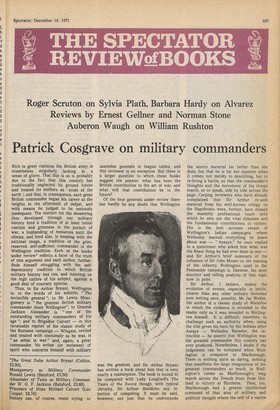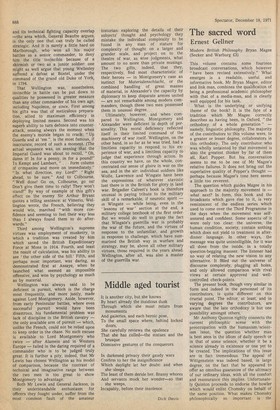Patrick Cosgrave on military commanders
Rich in great captains the British army is nonetheless singularly lacking in a sense of gloire. That this is so is probably due to the fact that this country has traditionally neglected its ground forces and treated its soldiers as 'scum of the earth '; and that, in consequence, each great British commander began his career at the heights in the aftermath of defgat, and with means he judged to be seriously inadequate. The instinct for the shoestring thus developed through our military history bred a tradition of at least initial caution and grimness in the pursuit of war, a husbanding of resources until the climax, and bred also, in keeping with the national image, a tradition of the grim, reserved, self-sufficient commander in the Wellington tradition. Each of the books under review* reflects a facet of the truth of this argument and each author, further, finds himself struggling with the selfdeprecatory tradition to which British military history has run, and insisting on the high calibre of his subject, against a good deal of contrary opinion.
Thus, to Sir Arthur Bryant, Wellington is, in the Words of his subtitle, "The invincible general "; to Mr Lewin Montgomery is "the greatest British military commander since Wellington"; to General Jackson Alexander •is "one of the outstanding military commanders of his age "; and to Brigadier Calvert — in this invaluable reprint of his classic study of the Burmese campaign — Wingate, reviled and treated with contumely as he was, is "an artist in war" and, again, a great commander. No writer (or reviewer) of spirit who concerns himself with military
*The Great Duke Arthur Bryant (Collins, £3.50).
Montgomery as Military Commander Ronald Lewin (Batsford, £3.50) Alexander of Tunis as Military Commander W. G. F. Jackson (Batsford, £3.60) Prisoners of Hope Michael Calvert (Leo Cooper, £2.10)
history can, of course, resist trying to assemble generals in league tables, and this reviewer is no exception. But there is a larger question to which these books suggest the answer: what has been the British contribution to the art of war, and what will that contribution be in the future?
Of the four generals under review there can hardly be any doubt that Wellington
was the greatest, and Sir Arthur Bryant has written a book about him that is very nearly a masterpiece. The book is bound to be compared with Lady Longford's The Years of the Sword though, with typical chivalry, Sir Arthur disclaims any intention of competing. It must be said, however, not just that he understands
the source material far better than she does, but that he is far her superior when it comes, not merely to describing, but to re-living a battle, so that the commander's thoughts and the movement of his troops march, so to speak, side by side across the Page. Carping reviewers who have already complained that Sir Arthur re-uses material from his well-known trilogy on the Napoleonic wars, further, have missed the masterly professional touch with which he sets out the vital climaxes and the fundamental contributions to victory. His is the best account extant of Wellington's Indian campaigns, where Wellesley learned everything he knew about war — " Assaye," he once replied to a questioner who asked him what was the finest thing he had ever done in war — and Sir Arthur's brief summary of the influence of Sir John Moore on the training of the infantry Wellington used in the Peninsular campaign is, likewise, the most succinct and telling analysis of that topic now in print.
Sir Arthur, I believe, makes the evolution of events, especially in battle, clearer than any other military historian now writing save, possibly, Mr Jac Weller, the author of a classic study of Waterloo in which the evidence is revealed to the reader only as it was revealed to Wellington himself. It is difficult, therefore, to challenge such an authority when, using the title given his hero by the Indians after Assaye — Wellesley Bahadur, the invincible — he asserts that Wellington was the greatest commander this country has ever produced. Nonetheless, I doubt if the judgement can be sustained when Wellington is compared to Marlborough. There is nothing quite as daring, nothing that manifests the large imagination of the greatest commanders so much, in Wellington's career as Marlborough's long march across the French front from Holland to victory at Blenheim. Then, too, Marlborough had a greater intellectual command of that area of military and political thought where the will of a nation
and its technical fighting capacity overlap —the area which, General Beaufre argues, is the only one that can truly be called strategic. And it is surely a little hard on Marlborough, who won all his major battles as a senior commander, to deny him the title invincible because of a skirmish or two as a junior soldier: one might as well argue that young Wellesley suffered a defeat at Boxtel, under the command of the grand old Duke of York, in 1794.
That Wellington was, nonetheless, invincible in battle can be put down to qualities he possessed in greater measure than any other commander of his own age, including Napoleon, or since. First among his gifts was that of meticulous prepara tion, allied to maximum efficiency in deploying limited means. Second was his superb ability to turn defence into counter attack, sensing always the moment when the enemy's morale began to crack: "Up Guards and at 'em ", is the most famous, if inaccurate, record of such a moment. (The actual sequence was, on sensing that the Imperial Guard was about to recoil, "Oh, damn it! In for a penny, in for a pound!" To Kempt and Lambert, " . , . form column of cnmpanies and move on immediately."
" In what direction, my Lord?" "Right ahead, to be sure." And to Colbourne, " Well done! Go on, Colbourne, go on!
Don't give them time to rally! They won't stand!" By way of example of this gift's effect on the enemy Sir Arthur Bryant quotes a telling sentence: at Vimerio, Wellington wrote, the French, believing they would win, marched "with more confidence and seeming to feel their way less than I always found them to do afterwards."
Third among Wellington's supreme virtues was employment of musketry, in which a tradition was created by him which saved the British Expeditionary Force at Mons in 1914. Fourth, and least the result of calculation, was his ability to see 'the other side of the hill.' Fifth, and perhaps most important, was daring, as demonstrated first at Assaye, when he launched what seemed an impossible offensive, and won by psychology as much as by material.
Wellington was always said to be deficient in pursuit, which is the charge most frequently, and more justly, made against Lord Montgomery. Aside, however, from early Peninsular battles, where even successful pursuit would have been disastrous, his fundamental problem was lack of discipline in the British cavalry — the only available arm of pursuit — which, unlike the French, could not be relied upon to keep order in the chase. No such excuse is available to Lord Montgomery who twice — after Alamein and in Western Europe — failed in the daring required of a commander who is to be judged truly great. It is further a pity, indeed, that Mr Lewin has chosen Wellington as his model of comparison, because the contrast of technical and imaginative range between the two men is too great to show Montgomery to advantage.
Both Mr Lewin and General Jackson, in their understandable enthusiasm for officers they fought under, suffer from the most common fault of the amateur historian: exploring the details of their subjects' thought and psychology they mistake the individual complexity to be found in any man of stature for complexity of thought on a larger and grander scale, and project on to the theatre of war, as wise judgments, what amount to no more than private musings. The two gifts, indeed, that they, respectively, find most characteristic of their heroes — in Montgomery's case an instinct for Materialenschlacht, or the combined handling of great masses of material, in Alexander's the capacity by diplomacy to keep disparate armies united — are not remarkable among modern commanders, though these two men possessed them in unusual degree.
Ultimately, however, and when compared to Wellington, Montgomery and Alexander were deficient in depth of personality. This moral deficiency reflected itself in their limited command of the machinery of war itself. Wellington, on the other hand, in so far as he was tried, had a limitless capacity to respond to his experience of war, and a limitless capacity to judge that experience through action. In this country we have, on the whole, concentrated our sense of gloire in war on the sea, and in the air: individual soldiers like Wolfe, Lawrence and Wingate have been the expressions of whatever atavistic lust there is in the British for glory in land war. Brigadier Calvert's book is therefore unusual in paying tribute to the military skill of a remarkable, if neurotic spirit — in Wingate — while being, even in the 'lessons of war' section at the end, a military college textbook of the first order. But we would do well to grasp the fact that Wingate's guerrilla war is probably the war of the future, and the virtues of response to the unfamiliar, and growth in response to challenge, which have summarised the British way in warfare and strategy, may be, above all other military virtues, those required in the years ahead. Wellington, after all, was also a master of the guerrilla war.











































 Previous page
Previous page